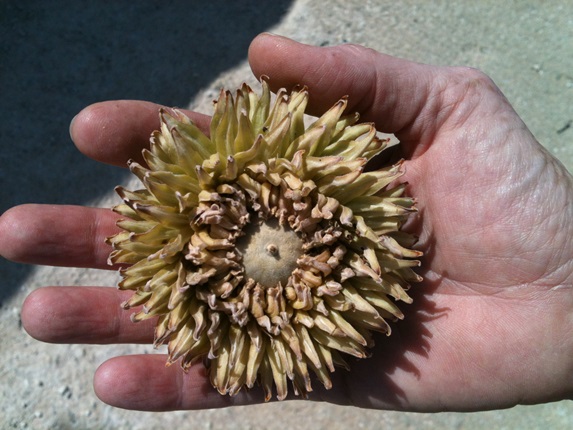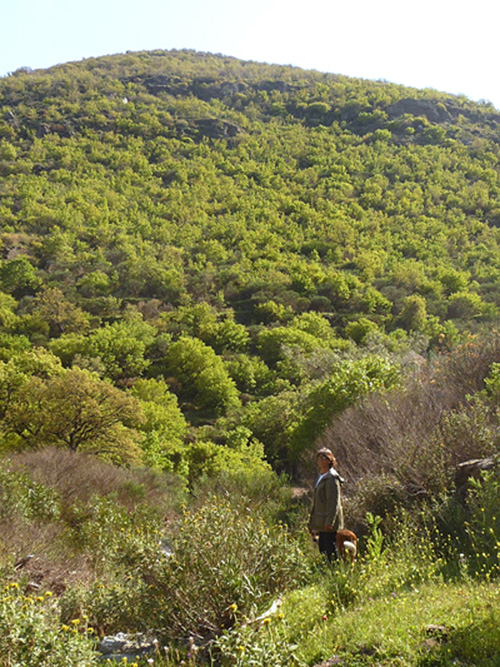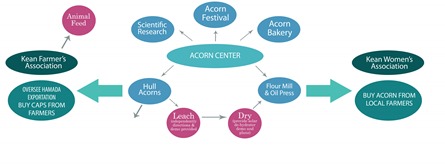By Marcie Mayer, Founder of the Hamada Acorn Initiative
The Hamada Acorn Initiative began as an effort to bring acorn awareness to the minds of local residents and people worldwide, through international crowd funding and a frequently updated website. Creating sustainable opportunities for oak-based income for farmers on Kea Island in Greece was the best and most immediate way to protect the trees, especially as the economic crisis hit and trees rapidly became used for firewood. As the project grew, and more farm families got involved, two separate entities evolved. The first, a non-profit organization “HAMADA ACORN INITIATIVE” to oversee the annual acorn cap exportation to Germany, India & Greece. The second, a private company, based at the Red Tractor Farm, for producing acorn flour, acorn cookies and other baked acorn goods. The Red Tractor Farm is an agrotourism project including professional food catering.

In 2014, forty-two farming families collected thirty six tons of giant acorn caps from the Valonia oak stands on Kea for the third annual exportation. All of Kea's indigenous oak forest is privately owned and despite being a Natura 2000 site, entire trees have been removed rapidly without respect to proper forest regeneration since the mid-1960s when farmers were cut off from the centuries old tradition of exporting acorn caps to the leather tanning industry in Europe.[1] In recent years there has been a renewed interest in vegetable tanning methods of which oak is considered the very finest. Leather-related industries are the fifth largest industry sector globally.[2]
After only three years the Hamada Acorn Initiative has begun to take on a life of its own as local farmers take their own initiatives to introduce oak-friendly methods. Ten black acorn foraging pigs were acquired from central Greece and reintroduced by the Kea Farmer's Association in December 2013.
A brief outline of the Hamada Acorn Initiative's activities:
Oak Conservation
- Education & Awareness: Community Meetings, Seminars
- Sustainable Opportunities for Oak based Income: acorn caps & acorns
Acorn Research & Development
- Nutritional Documentation
- Optimum Processing Procedures
- Product Development
- Practical Support (mentoring worldwide) & Networking
Community Outreach
- Annual Acorn Festival
- Free hulling service to local residents for animal feed
- Acorn Center & Acorn Bakery & Craft Center
- School visits
- International Intern Program for acorn gathering & processing
- Fundraising

I've spent over a decade gathering and experimenting with acorn processing methods, testing and finally developing a 6 day method for producing 400 kilos of gluten free acorn flour from stored acorns. From Native American and Korean recipes I first explored possibilities with aromatic acorn flour and recently launched my first product, Acorn Cookies. I maintain a comprehensive website concerning acorns through which I've made many connections all around the world and I am now consulting several Native American Tribes about promoting their acorn products.
The key to creating long-term sustainable prosperity for rural areas in Greece needs to be based on the unique strength and diversity of local communities and built on solidarity, not competition. In the 21st Century rural areas face the multiple challenges of producing food, restoring and protecting the ecosystem and producing energy as oil reserves dwindle. Truly resilient systems must be based on strong social cohesion at the local level. The structural framework for the Hamada Acorn Initiative can be seen in the graph below:

Island people take as a gift the new outside interest in sustainable systems built on social currency. Every farmer knows that diversity is the key to resilience in an agriculturally-based economy. The Farmer's Association on Kea was quick to respond and support my efforts when first alerted to the possibility of reigniting the annual acorn cap exportation. The oldest generation on Kea was particularly supportive and shared their knowledge of harvesting and storage techniques.
The Hamada Acorn Initiative was created to spread the word that the ancient oak forest on Kea is unique, worth protecting and can easily become a sustainable source of income for local farmers. The project began as a simple appeal and awareness campaign to stop indiscriminate felling of indigenous oaks. The campaign was first launched in May 2011 and in just a few years many objectives have been met and surpassed. The giant acorns and acorn caps of Kea have created new sustainable income for the island's farmers and a greater awareness of new possibilities for the silvopastoral forest we live near as a unique and benevolent ecosystem.
Farmers recently met with Dr. Pantera to discuss opportunities for responsible management of the forested areas. Dr Pantera's report on the Acorn Festival can be found here.
Crowdfunding campaign to establish a permanent home for the Acron Center on Kea at the port of Korissia.
The campaign ended on 30 December 2014.











